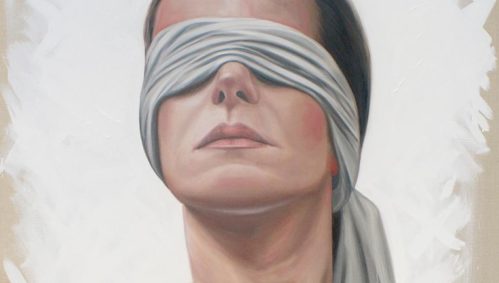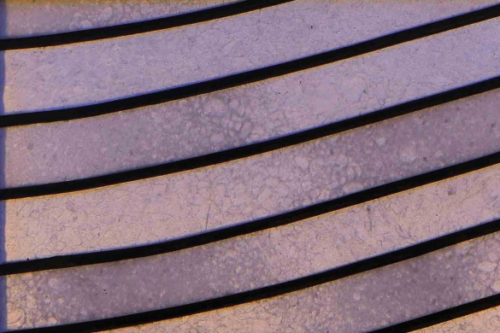
Jack Whitten
“[There] is often, to a smaller or greater extent, a savior or Messiah complex, with the secret thought that one day one will be able to save the world; that the last word in philosophy, or religion, or politics, or art, or something else will be found. This can progress to be a typical pathological megalomania, or there may be minor traces of it in the idea that one’s time “has not yet come.” The one situation dreaded throughout by such a type of man is to be bound to anything whatsoever. There is a terrific fear of being pinned down, or entering space and time completely, and of being the one human being that one is.”
Marie Louise von Franz (Interviews with Susan Wagner )
“But the authoritarian man is ambivalent; he loves and hates his gods simultaneously and thus often rebels blindly against the existing power. His irrational revolt, however, does not change his emotional structure or the structure of society. It merely substitutes a new authority for the old. The real revolutionary personality, as contrasted to the authoritarian type, is rational and open to reality; in other words, represents the full-grown adult who is not governed through a combination of fear of punishment and desire for approbation by paternal authority. His heroism lies in the changing of the material world — the heroism of the authoritarian type in submission to destiny.”
Karl Korsch (‘Marxism and Psychology’, Living Marxism 1942)
“I use that term ‘cult’ to describe the social organisation that Jung gathered around himself after his break with Freud. He was living at the time in Küsnacht, Zurich, in Switzerland. Essentially, at first, he gathered primarily German-speaking Swiss around him, and a few Germans, then people from Britain and the United States. His biggest catch was the daughter of John D. Rockefeller who, in 1916, poured more than a million dollars (in 1997 US dollars) into his enterprises.”
Richard Noll (interview with Ivan Tyrell)
“The tradition of the oppressed teaches us that the “emergency situation” in which we live is the rule. We must arrive at a concept of history which corresponds to this. Then it will become clear that the task before us is the introduction of a real state of emergency; and our position in the struggle against Fascism will thereby improve. Not the least reason that the latter has a chance is that its opponents, in the name of progress, greet it as a
historical norm.”
Walter Benjamin (On the Concept of History)
The critique of the Odyssey in Dialectic of Enlightenment saw the figure of Odysseus as the ur-subject for western culture — and implicated the instrumental logic of Enlightenment values for creating a spiritual homelessness. The sacrifice of desire in order to reclaim property and annuities and prestige. And by extension a place in relation to one’s own community. The emergence of the rational being, at least within a propertied class that was to reject the mythology of pre-history. But the mythos continued within this subjectivity. The current climate discourse, it is becoming clear, has created a new frame and need to reclaim something that is sensed as lost. But it is a regressive myth of all hierarchical societies. Its not lost. Its found.

Howardina Pindell
James Hillman once said the primary American addiction is to keeping oneself unknowing — a sort of ersatz innocence. And the idea of innocence is acutely attractive to Americans, I think. There are countless (literally) examples where a fiction narrative is described as being a loss of innocence story. Usually this takes the form of a collective loss, America’s loss of innocence. There is a deep need to imagine American history starting from the garden of Eden. Geoffrey Beattie quotes R.W.B. Lewis on the founding belief in American culture…
“…an individual emancipated from history, happily bereft ofancestry, untouched and undefiled by the usual inheritances of family and race; an individual standing alone, self-reliant and self-propelling, ready to confront whatever awaited him with the aid of his own unique and inherent resources. “
(Why Aren’t We Saving the Planet, Beattie)
The loss of belief in transcendent powers or ideals is well catalogued. The growth of cults and new-age philosophy, self help books and the culture of therapy; all of this speaks to some escape from the daily anxieties and insecurities of unemployment, erosion of community and family, and now global warming. The entire climate discourse has now deviated from environmentalism to a kind of theistic sense of purpose that goes well beyond lowering the thermometer. And here there is an intersection of sorts with a new incarnation of the messiah complex. Now Jung himself was the author of but also the auteur of the messiah complex and set himself up as a kind of prophet. Not that he is without real value but he also created a kind of cultish following with all the attendant trappings of Aryan tribalism.

Jennifer Guidi
In that same interview Noll writes…“Jung saw psychoanalysis as path of redemption, of revitalization, of rebirth. Indeed, he wrote of psychoanalysis becoming a totalising world-view saying: “great is the power of the psychoanalytic truth, and it will prevail”. For him, psychoanalysis was the new salvation of the world, with Jung as the prophet who understood its religious nature. Religion, he believed, could only be replaced by another religion.”
And again, like Greta, this is the return of the Aryan metaphysics that is reflected darkly in the mirror of National Socialism. Many people (protectors) get very upset with attacks on Greta — and often this has little to do with Greta or the climate crisis. It is much more an individual compensatory action, an expression of neurotic anxiety and narcissism both. And in my experience it is middle aged white men who are most inclined to serve as protectors of the figure of this teenage climate Joan d’ Arc. And here is a curious intersection between propaganda, media indoctrination (including the damages associated with internet and social media habituation), sexual repression (and a climate of acute sex negativity) and this new theosophic purpose designed to usher in a new era of environmental ecstasy. That the earth is getting warmer, regardless of the reasons, is a fact, and its not going to be changed or stopped. It may well stop of its own, and it may not, but none of that has the least to do with this new eco-cultural frame that is gaining momentum. One sign of cult membership is a mutual special vocabulary — known only to initiates. And this is true of the new corporate backed environmentalism, and its true even on the left. There are always these dog whistle words or phrases. And they get repeated a lot to ensure recognition of membership.
The idea or fantasy of innocence runs throughout American art and culture, especially in literature, but also in film. From the cuckold Doyle in Nathaniel West’s Miss Lonelyhearts, to Donatello in Hawthorne’s The Marble Faun, to Huck Finn for that matter, to Billy Budd and Catcher in the Rye. And in film, more recently, Rain Man, Quiz Show, and Being There. And in two of those films a learning disability equates with innocence, and in the other American society is envisioned as a TV quiz show. Forrest Gump, too, is an icon of unknowing innocence. Against this came the post WW2 backlash of film noir, overwhelmingly made by German Jewish emigre directors. And the protagonists were borrowed from American pulp fiction and writers such as David Goodis and Jim Thompson. And of course Raymond Chandler and Dashiell Hammett. But in the best noir, from Out of the Past to Criss Cross, the thrust of the narrative serves as a dismantling of the very idea of innocence. They were not stories of lost innocence, but rather portraits of a world without innocence, where it had never been there. But that noir sensibility retreated dramatically in the 50s. It was replaced with an authoritarian innocence (Jack Webb and Dragnet, and the revanchist patriarch western series such as Bonanza).

Ernest Pignon Ernest
But lurking at the edges of even anti-naivety work in the sixties was a creepy adjustment to authority as an ideal. By the teen films of the 80s (Ferris Bueler’s Day Off, Sixteen Candles, Breakfast Club et al) the backdrop — though obscured — is the white anodyne suburbs that never existed. A suburbs very close to a mental hospital for schizophrenics.
There is also, sort of hidden in plain sight, a growing rehabilitation of authoritarianism in overdrive today. And, really, of fascism. The massive pornography industry is intwined with the screen damaged AND with sex negativity. Statistically young people are having less sex but exercise pornographic activities at an increased level. There is an official rhetoric of puritanism that comes under cover of sociological and therapeutic responsibility (sic). I have heard people say (often, in fact) ..well, she was only sixteen (or he was only sixteen) and hence cannot give consent. This logic leads to an idea that any sexual activity by minors is both illegal and immoral.
The rise of an volkisch style code replete with blond pig tailed children — who probably unsurprisingly is autistic — allows for a channelling of that angst and depression, those feelings of alienation and loneliness, so carefully cultivated by the system, into a fantasy narrative of Edenic redemption and serves as an outlet for such unease. Greta is, then, an environmental Rain Man by way of Girl Interrupted. (worth comparing One Flew Over the Cuckoos Nest to Girl Interrupted as a study of the rightward shift in U.S. culture). Her *uniqueness* registers as possessed of special gifts (she even claims magic powers) and since she is but 15 years old, and has a special needs learning capacity and impaired social skills, she is a blank slate onto which anything can be projected.

Ken Doman, photography. (left hand of Sitting Buddha, Shakyamuni, Miroku Muro Ji Nara 1942)
“I take it that I should begin by saying something about the modern sense of crisis. When you read, as you must almost every passing day, that ours is the great age of crisis—technological, military, cultural— you may well simply nod and proceed calmly to your business; for this assertion, upon which a multitude of important books is founded, is nowadays no more surprising than the opinion that the earth is round. There seems to me to be some danger in this situation, if only because such a myth, uncritically accepted, tends like prophecy to shape a future to confirm it. Nevertheless crisis, however facile the conception, is inescapably a central element in our endeavours towards making sense of our world.”
Frank Kermode (The Sense of an Ending)
Kermode quotes George Eliot elsewhere; “‘Beginnings are always troublesome,’ says George Eliot; and ‘conclusions are the weak point of most authors,’ she adds, noting that ‘some of the fault lies in the very nature of a conclusion, which is at best a negation.” This is within a discussion of millennial anxiety, and of the strange contradictions of early modernism and late. Kermode is very good within certain limits. And his notes on Yeats and Pound and Eliot and finally Joyce are quite unexpectedly illuminating. In English anyway the early modernists harbored a strangely reactionary and even regressive sensibility. They were clerkly (Kermode’s word) and yet also radicals. Joyce was the least afflicted with the neo fascistic that haunted Pound, and even Eliot. I go into this because I think it is important today, in trying to define the new frame that is forming even now on western culture, to recognize how little literacy is left in the Western imagination. And that there has always been a white racist intellectual architecture sedimented into the upper reaches of western intelligentsia.
Kermode notes of Burroughs “His is the literature of withdrawal, and his interpreters speak of his hatred for life, his junk nihilism, his treatment of the body as a corpse full of cravings. The language of his books is the language of an ending world, its aim, as Ihab Hassan says, is ‘self-abolition.’ The Naked Lunch is a kind of satura, without formal design, unified only by the persistence in its satirical fantasies of outrage and obscenity.”
Early modernism in architecture or painting is far less afflicted with this strange sense of conservativeness. But it’s also nearly impossible to define what one means by early modernism. For the purposes here the western (European and North American) culture were different but still closely related. And the colonial white supremacist ideology was never too far from the surface.

Ans Markus
There are writers terribly neglected during the 20th century. Some of them for obvious reasons, but others for reasons that remain unclear — and troubling somehow. I’ve always suspected that class was the hidden element, especially in work that was decidedly anti bourgeois. But making that distinction is often not easy. Burroughs himself being an example. Others like Robert Walser are easily outside most everything and hence the more haunting (compare Walser to Sebald). But back to the frame of climate end-of-times. There is an acute issue of sincerity in all this. For this is the least sincere movement of any sort that I can ever remember. I wrote something offhandedly on social media where I called Greta creepy. I was quickly admonished. Did I believe the person admonishing me was sincere? Did he really feel offended, as he said? I’m pretty certain he was not feeling offended. But this is the performative aspect of social media. And it is the performative aspect of the new Extinction cult.

Thomas Eakins, photography (1883 apprx).
There is something that ties capitalism to the idea of a messiah-like subjectivity. Class society provides stratification and authority breeds a sense of self importance. Under capitalism it is impossible to not to imagine and then feel drawn toward figures of redemption. Christ like innocence. For now in the second decade of the 21st century even our bosses feel like Christ figures.
“In other words, the idea of happiness is indissolubly bound up with the idea of redemption. The same applies to the idea of the past, which is the concern of history. The past carries with it a secret index by which it is referred to redemption.”
Walter Benjamin (ibid)

Tchunmo Nam
Now by way of a short digression here. Walser, who I think is an important writer and whose most important work is Jakob Von Gunton is one of the top twenty books of the century, for all that there is a tiny bit of twee appreciation about Walser. He was firstly a patient at a sanatorium for much of his life. He was given to long walks alone in the hills near the facility. Walser has been adopted, in a sense, by the intelligentsia of the West (see Susan Sontag, who– weirdly — seems to still matter) and ranked alongside Kafka and others. In fact I think Walser is just a bit too perfect a construction, too unthreatening (in the way Thomas Bernhard is threatening, or Genet or Pinter) and too much a kind of intellectual *pet* meant for taking on, well, long walks. Long walks in the mental salons of the early 21st century. Bernhard, a greater writer, or even a Herman Broch, also a greater writer, are not domesticated in quite the same way as Walser. This is not to at all minimize the depth of Jakob Von Gunten, nor his short fragments, or even his curious and disquieting short book of art criticism (if thats what it is). Walser is a far more radical voice than Sebald, for example. One is bourgeois and one is anti bourgeois. But then Sebald has created his persona as the bourgeois academic and dilettante, one with a tepid ennui and bloodless narcissism. A perfect prestige product for the University post grad and the NYTimes book review section. Now I should add that I think Sebald can write, I think he is a very smart stylist and a producer of stuff that has great merits, but always somehow ends up being less than the sum of its parts. Sebald is a bit like Musil without the intellect.

Baron Raimund von Stillfried, photography. 1880s. Samurai.
“The maker of kitsch does not create inferior art, he is not an incompetent or a bungler, he cannot be evaluated by aesthetic standards; rather, he is ethically depraved, a criminal willing radical evil. And since it is radical evil that is manifest here, evil per se, forming the absolute negative pole of every value-system, kitsch will always be evil, not just kitsch in art, but kitsch in every value-system that is not an imitation system.”
― Hermann Broch (Geist and Zeitgeist: The Spirit in an Unspiritual Age)

Robert Walser
C. Wright Mills said something along the lines that the Enlightenment was man’s fate ruled by reason. It was called The Age of Reason. The basic notion of instrumental thinking, which has been much written about, certainly, rarely features how systematic thinking (scientific even, or often) is also prone to functioning, bureaucratically, as a closed system. There is a whole post to be devoted to the evolution of bourgeois science, and especially to the post WW2 world of academia and science, of corporate funding and of *results*. The myth that was carried along within the cleansing of irrationality and dogma that was the Enlightenment is a myth or mythos of exclusion and protection (paranoia). And this exclusion led to a policing of thought, an enforcement of conformity to the model.
“…the postwar years now appear as a detour, and the 90s increasingly line up as a direct extension of the 30s, though with a major proviso: American intellectuals of that earlier epoch Edmund Wilson being exemplary were optimistic; they believed they could see what was taking place at the heart of things, and that social criticism could transform, and if necessary, overturn society. Today, by contrast, social devastation is simply beyond adequate cognition: there is a bewildering sense that faced with its essence, we could not describe it. In that the return of the thirties is not strictly factual or simply metaphoric but is regression in the psychoanalytic sense of the return of problems that were never solved in the first place, left to themschlevs they have in the meantime also worsened for the concepts that once named what was occurring alienation, overproduction, reification,…etc.”
Robert Hullot-Kentor (Notes on Dialectic of Enlightenment, New German Critique)
It is important to examine the critique that Horkheimer and Adorno put forward in the context of American anti communism at the time. For this was Odysseus in Hollywood, it was J. Edgar Hoover branding German Jewish intellectuals (mostly socialists) as *communazis*. And Hoover was the embodiment of a certain strain of American puritanism. A sadistic strain and one fraught with obvious contradictions.

Murray Fredericks, photography. (Closed DYE-2 Radar Station, Greenland).
“According to documents released under the Freedom of Information Act, the Institute for Social Research (or the Frankfurt School, as it has come to be known) was the object of a widespread surveillance operation by the FBI as early as 1934. Almost without exception, nearly every member of the Frankfurt School in exile—Theodor Adorno, Max Horkheimer, Herbert Marcuse, Henryk Grossman, Leo Lowenthal, Karl Wittfogel, Frederick Pollock, Franz Neumann, and several others—was policed and investigated; their mail and telegrams were opened and read, their telephones wiretapped, their apartments burglarized, their private affairs scrutinized, and their income taxes audited, all for the slightest sign of any radical, left-wing political activity. ·( ) Indeed, the FBI had enormous difficulty in grasping exactly what kind of communication it was monitoring. Memoranda and telegrams sent from Horkheimer to Adorno that discussed the philosophy of Nietzsche were redirected to confounded cryptographers and analysts on the grounds that the two critics were writing to each other in cipher. J. Edgar Hoover thought the mention of “Nietzsche” and “[German] Expressionism” could “possibly be code.”
Andrew N. Rubin (Archives of Authority)
Adorno noted in Minima Moralia that anything not reified, that cannot be counted or measured, ceased to exist. And I suspect that if Adorno were alive today he would feel he didn’t go far enough in this critique. For it not only ceased to exist, or that experience was increasingly constricted (as he put it) but that the hidden irrational myths that were being carried (and promoted) were tied in at their base with that white supremacist logic that also bred eugenics, of which Darwin, for both good and ill, partook. It is that deepest layer of self denial and alienation that drives this prostration before the Christ, your immediate supervisor.

Gauillaume de Marcillat (Dispute over the Immaculate Conception, 1516) detail.
It is interesting to note Adorno’s complaints about student activism just before his death. He was ambivalent but never wavered about the identitarian nature of a certain strand of activism. It was a false reconciliation of theory and praxis. He saw something deeply regressive about instrumental thinking, even in protest. That anti colonial struggles were important, they were not suited to a totally administered world where they were reduced to games. That protest was trending toward positivism was perceived as only negative.
The pantomime of labour (except for the increased proletarianization of service jobs) relations today, the compulsively repetitive reforms and counter reforms in the workspace are like puppet shows where in the end there is no end. The toy stage and the puppets are packed up and carted off to perform a new (old) story at the next power point conference. The same stale buffet food beneath the same past due fluorescent bulbs and the same semi industrial carpeting, all of it is designed as a kind of purgatory or anteroom to hell.
This is why aesthetic resistance is important. Why the form of expression matters, and how looking to educate and raise awareness of not simply issues, but awareness of the deformity of thought today matters as well.
“…the unsolved antagonisms of reality return in artworks as immanent problems of form.”
Adorno (Aesthetic Theory)

Carlos Fajardo
The volksich and cultic aspect of the Greta brand reverberates with some of the foundational elements in Jungian thinking, and in particular the backdrop of Pietism. As Nicholas Boyle (in a biography of Goethe) noted, Pietism has an affinity for state absolutism. For it focuses (to the point of hypochrondria) on the individuals inner emotions, and its relation to the state of his or her immortal soul. And all differentiation is cast aside, and all suspect commentary (the outer world) is abandoned. Jung grew up in a climate infused with Pietistic belief. The Jungian idea of individuation (which is not all that removed from a number of other psychoanalytic theories) is also not that far from 12 step programs. The role of a tragic guilt that must be expiated in the start of surrendering to the initiation. The sponsor role is secular clergy in a sense, and the moral inventory is tied directly to the radical Lutherinism that rose alongside and with a volkisch project of racial superiority.
But today, the draw of the extinction theory is that of submission to the inevitable. It very clearly is not fully grasped or experienced as literal, and increasingly I find the cheerleaders for this alarmist narrative to treat it rather symbolically.

Sohrab Hura, photography.
“…once it was asserted that a language reflected a cultural world view, once it was viewed as ‘mothertongue’, then it was evident that there was something precious or intrinsically valuable about the particular structure associated with a particular group or nation.”
Christopher M. Hutton (Linguistics and the Third Reich)
During the rise of National Socialism, Ernst Junger wrote an essay In Defense of Vowels. The matter of how people spoke had cultural and political implications, and all of it is couched in a vitalist (Bergsonian) philosophical code.
“It is the vowel that dominates in this ‘wordless language of passion’. That domination is seen in the purely vocalic nature of mother–child language, but can also be seen in the sounds humans use to communicate with animals. It is found in the language of incantation and human mystery. This mystical and original language is prior to, and transcends, human tribal and cultic divisions.”
Christopher M. Hutton (ibid)
But today the volk are mute. And again, Greta sort of fits into this rather nicely. If you watch her interview with Naomi Klein, you see Klein is increasingly uncomfortable with Greta’s oddly inappropriate speech qualities. She (Klein) later appeared on Democracy Now to do a kind of damage control, and in the process essentially praised Greta FOR being on the spectrum. That this allowed her a unique quality as a leader and (yes she used the word) prophet. The prophet who cannot really speak, but is the better for that because the flock cannot really listen.

Unknown Spanish painter. Late 18th century. (Mater Dolorosa)
It is easy enough (and not wrong) to write off the Greta phenomenon (and attendant movements) as just a giant PR campaign. But it also represents something more, and is part of a larger capitalization of this urge for a new volk, a redeemed climate community of believers. The extinction is metaphorical every bit as much as material (well, really its more metaphor actually), and the rebirth is enclosed within this screen mediated Pietism. As Hullot-Kentor noted above, its not *simply* metaphorical. This is a cultural and psychological regression, but also is part of a larger and unrelenting transference of wealth and property to the top one percent. And this has been stripped of all political import.
There are influences, too, from Theosophy. And it may be that those supposedly anti-establishment films of the 60s were self neutralizing because of the residual influence of Theosophy.
“Theosophy was in its day an important movement with links to both vitalism, characterology and linguistics. The Theosophical Society was founded by Helena Petrovna Blavatsky and Henry Steel Olcott in New York on 7 September 1875, and it spread rapidly as a movement, ultimately breaking into dissenting branches and rival movements. Theosophy can be defined in terms of occultism, esotericism, spiritualism, mysticism and gnosticism; the Theosophical movement drew on both Western esotericism (‘magic, Hellenistic and Renaissance neo-Platonism, the Cabbala, the Tarot pack, and communication with spirits’) and Eastern mysticism, especiallyVedanta and Mahayana Buddhism. Among those influenced by theosophy were W.B. Yeats, Mondrian, Kandinsky, Gandhi; perhaps the most prominent linguist to have taken theosophical ideas seriously was Benjamin Lee Whorf { } and Rudolf Steiner”
Christopher M. Hutton (ibid)
Now allow me to quote Dutton again here….“Theosophy can be seen an extension of nineteenth century ‘Orientalism’. Theosophists were critical of British colonial practice, especially in India. Yet they were also missionaries, though – paradoxically – missionaries of Indian culture and philosophy to India. While theosophy emphasized the universal brotherhood of all human beings, it was also built on esoteric knowledge and the unlocking of ancient secrets held by high caste initiates.” The studies of the East (Sanskrit et al) were suddenly illuminating the fact of ancient non European civilizations, and this fact had to be dealt with by establishing that in fact the best of these ancient cultures was only carried forward by Europeans, and incorporated within their values and beliefs. As Gaillard said, ‘behind the swastika was the Cross’– in China anyway — that was the drift here. Colonialism (culturally speaking) was just a way to further preserve the best of ancient wisdom and discard the worst. It was another act of cleansing.

Carrying the Olympic torch, outside Berlin 1936.
Frederik Crews reviewed several books, including Noll’s for NYRB (Sept 1994)…and Dutton quotes him. Now I am no fan of Crews…but…this is not incorrect ;
“Washington perceptively glimpses an affinity between Gurdjieffian cruelty and the ethos of purgative primitivism that led D.H. Lawrence among others – and the later Yeats could have been mentioned in the same connection – to flirt with proto-fascist authoritarianism as an alternative to bourgeois soul-death. Nor should we be surprised when occultism does link arms with reactionary ideologies. Sooner or later the gnostic habit of thought battens upon vitalism, belief in a life force that cries out to be unshackled from convention. And fascist doctrine stands ready to give vitalism a nationalistic and nostalgic twist: we must inhale the spirit of our warrior ancestors, who knew no democratic legalism and harbored no pity for the unfit and the foreign.”
And it points toward the influence of theosophy, and more, of the colonial imperialist logic that animated it. And it also would lead directly to Francis Galton and eugenics. And in a broader frame the entire vitalistic idea can be seen to have bled into Deleuze and Derrida, even (in differentiation). And it’s certainly present in Paul de Man. But for the purposes here, there are clear tracings between National Socialism, and Aryan cults, with Vitalism and eugenics, and with much new age theosophic minded self help stuff. And broader still this all unfolds upon the stage of the Enlightenment and its offspring. And the Pietistic backdrop, and the Lebensreform in Germany, were primary in shaping Carl Jung’s thinking and that of Heidegger. There are really a good many influences here, but all of them tied into a German (in particular) version of Orientalism. A fetishizing of Asian alphabets and language, as well as a Bergsonian reading of and translation of Chinese and Indian texts.

Pierre Soulages, stained glass for Church windows.
All of the Nazi era researchers were anti-semites, and there were speeches where Himmler compared the Fuhrer with Buddha. And throughout there was a careful scholarly concern with preserving the authentic German language. And I find this a symptom one finds whenever regressive forces seek to purify and exclude. The Nationalistic tendency is to preserve *our* language and customs. And there is a clearly progressive side to this. The wiping out of cultures begins with the destruction of history and language. The counter tendency in fascist movements is also preserve and fetishize our own pure language. There is a good deal more that could be said here, but to return to the sense of cultic thinking and emotional upheaval today, the difficulty for those orchestrating the brand identity is that nobody reads. Language is no longer operative in the way it was for Himmler or other colonial and genocidal nations. The prophet speaks, sort of, but not well. And most of this is, of course, transmitted via one kind of screen or another. And this is a hugely significant factor — for the screen mediation amplifies questions of sincerity. Or, rather insincerity. For the loss of interior life, and what I wrote of last time and called the digital Khora, these psychological and developmental issues serve to direct the emotional unrest in a certain direction. The corporate appropriation of the climate discourse has found the propaganda associated with Greta works so well because the meaning is entirely fungible. Who cares what she says, she is a prophet (at least until puberty I suspect, for the messiah/protector cannot protect the hormonally disruptive. Just as the white protector seems to never concern himself with dead children in Gaza or Baghdad). The fact that so much of America finds volkisch symbology so appealing is something to ponder.

Motohide Takami
That the spiritual homelessness of capitalism and instrumental thought has also created a society of the crippling anxious and a collective sense of hopelessness, is constantly being paid lip service by the University educated, but in a context of identitarian obscurantism. That hopelessness is denied and the cost of that denial has led to a severe deficit in energy and health. The technological system of control bred denial into its code. But as the second decade comes to a close of the 21st century, the western imagination has dried up in the same way America’s aquifers have dried up. Extinction as a parable took hold without much resistance. The cost of so many disappointed dreams has meant the system built a robotic world without dreams. Just don’t dream. There, fixed.
There is always an after. Suffering is far more complex to think about. Politics and suffering more complex still. Complexity is not a word the prophet uses. Corporations avoid it, too.
To donate to this blog please use the paypal button at the top. Its much appreciated.

Excellent work. Broch’s approach to ideal typologies in The Sleepwalkers, with class inherent, is germane.
I’ve noticed a resignation and self implication when discussing climate change or anything remotely related to it. I’m told we are all complicit, that it’s our fault. I’ve mostly noticed this among the liberal class, but it creeps into the working class. I suppose technically we are complicit, but it’s clearly a coerced and violently enforced complicity. Everyone reading John’s work already knows this. What strikes me is the self blame, the professed guilt when really very few have any say in these massive dominant structures and spectacles. I suppose this is partially a vestige of mythological/religious dogma detached from the text and now firmly installed or reified into what we call society.
Not only does this blame seem dangerously wrong, any suggestion that something like say, capitalism is a root cause to forever expansion and production chasing falling profit, you get assured proclamations about human nature and the evil of humanity. Even when they agree our economic base is in fact the problem, it doesn’t matter because we are bad. Its the resignation that is most disheartening, the unwillingness to see anything beyond where we are. A bizarre attachment to the status quo that most seem happy to complain about, a hobby.
yes!
yeah that relationship between the religious institutions and laws, AND submission to these huge cosmological (almost) narratives about extinction and climate is complicated. its a good topic.
It’s a topic that keeps getting brought up when I talk with almost everyone. People just regurgitate “people are bad” as if it was a programmed talking point. So they kvetch about all the obvious contradictions of capital but refuse in a knee jerk way to go beyond, at all. Cue the apocolyptic nihilism. I know you have gone over this at length John but the combo of media meta narratives is incredibly powerful, especially when it takes upnfrom puritanical mythology of work ethic conditioning.
I see it in artists just as much. They aesthetisize environmental destruction while flat out refusing to see the social reproduction they are performing. A complicity they actually might have a say in if they could see the coersive structures that surround them. If only the passive childlike nihilism could be turned on the structures of domination.
Another great essay! I’m fascinated with your 2019 writing as you appear to have predicted what followed in 2020.
Have you gone so far to reconsider if the climate is actually warming? That’s something I have begun to question.
It doesn’t really matter though. If it wasn’t the climate warming it would be another catastrophe.
interesting question. Those of us on the podcasts have been discussing this. Short answer is I no longer believe anything regards climate. None of the carbon stuff, if only because there is never a mention of the military. No mention of private jets, etc etc etc. And then the manufactured food crises (or crisis) and right now the Dutch farmers and the focus on insect protein and on and on and on. There are many parts in motion right now.
“The massive pornography industry is intwined with the screen damaged AND with sex negativity. Statistically young people are having less sex but exercise pornographic activities at an increased level.”
Pornography has always struck me as the most devastatingly alienating “medium” (if that’s what you can call it). The sexual act is the most intimate experience that a couple can share. The visual aspect of this is a preliminary matter: courtship, setting the scene, foreplay. The role of the visual plays very little part in the consummation. Therefore, pornography – by which I mean “hardcore”, i.e. displays of penetration and therefore actual sex laid out for the viewer, involves a stark contradiction whereby the pleasure natural to coitus has been brutally removed from the viewer – by his very act of viewing. The question arises: where is the sex? The ones performing are mechanically doing a job, the watcher is physically separate. The gulf between them is absolute. There is no possibility of interaction. This sad situation also infects other matters e.g. recorded music but it is the physical intensity of sex that renders porn particularly damaging in psychological terms.
And that young people are now drifting increasingly towards porn rather than real intimacy is depressing and yet predictable.
The “evolution” of porn in the West over the 20th century would make an interesting study. From my own experience, there has been a drift from the 60s magazines of bikini clad women I sometimes discovered in my father’s cupboard and which scarcely merit the label of porn, through the “soft core” (i.e. nude) mags of the 70s onwards. “Hardcore” came from the continent i.e. Europe where many countries had a far more liberal view. The first such photos I saw truly made my eyes pop. Some writer once mentioned a curious expression: “visceral clutch”. As soon as I first read that, I knew exactly what it meant i.e. that sense of a fundamental shock on seeing material considered obscene. This is why “puritanical” campaigns against porn have the counterproductive effect of advertising the material. It is the “visceral clutch” of a taboo being broken that acts as the stimulus.
But the material itself embodies this furious alienation I mentioned. And this is why porn could well stand as the ultimate addictive commodity. It stirs up but cannot possibly satisfy. And as with all capitalistic ventures, it separates people from a process they would normally access immediately by inserting, as it were, a “middle” that involves profitable exchange via a parasitical mechanism.
Now of course, with the arrival of the internet, it is impossible to implement censorship – which the parasite class has no intention of implementing anyway or at least not in this area. The effect of all this accessible material is to render the young increasingly incapable of genuine face-to-face relationships.
And the transgender movement only exacerbates the solitude. I have always felt that transgenderism is a curiously sexless matter. Real sex is inescapably binary. This new “polysexuality” results in monads sundered from relationships and caught in a solipsistic spiral.
very good, george. You should reconsider a guest spot on the podcasts.